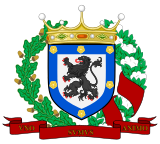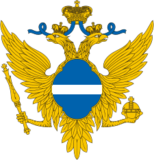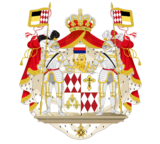Empire of Austenasia
Empire of Austenasia | |
|---|---|
| Motto: "IMPERATOR ET POPVLVS AVSTENASIÆ" | |
| Anthem: "God Save the Emperor" | |
 Austenasia within the UK, November 2024 : Greater Wrythe in purple, Caldari in blue, and Territories in red. | |
| Capital | Wrythe |
| Largest city | Chersoneses (by land area) Chalcedon (by population) |
| Other languages | English (de facto, unofficial) |
| Religion | Christianity |
| Demonym(s) | Austenasian |
| Government | Constitutional parliamentary monarchy |
• Monarch | HIM Emperor Aggelos I |
| Lord Andrew Creed | |
| Legislature | Parliament of Austenasia |
| Establishment | 20 September 2008 |
| Area | |
• Total | 1.09676567 sq mi (2.8406100 km2) |
| Population | |
• Census | 142[a] |
| Currency | Pound sterling (£) (GBP) |
| Time zone | UTC -8, to +10
|
| |
Austenasia, officially the Empire of Austenasia, is an autonomous territorial entity which claims to be a sovereign state[1] but is more commonly referred to as a micronation by external observers.[2] Founded on the island of Great Britain, Austenasia declared independence from the United Kingdom in September 2008.[3] It is an enclave and exclave country, consisting of fifty six non-contiguous pieces of land: twelve in Great Britain, ten in the rest of Europe, twenty five in North America, five in Asia, two in Australia, one in Africa, and one in South America.
Austenasia is an officially Christian country which views itself as a successor to and continuation of the Roman Empire. Much of its cultural trappings and many government positions reveal a classical or medieval Roman influence on the nation.
Austenasia is the foremost diplomatic and military power of the Carshalton Nations, with its Monarch being either sovereign or suzerain over them. Austenasia rose to a high level of diplomatic prominence in the MicroWiki Community between 2010 and 2011, and is considered by many to have been the most influential nation in said community from early 2013 until such notions of "community influence" began to lose meaning circa 2021.
History
Reign of Terry I
At 11:30am on 20 September 2008, the town of Wrythe declared independence from the United Kingdom as the Empire of Austenasia. Emperor Terry I was unanimously proclaimed the nation's first Monarch, and his son Crown Prince Jonathan was unanimously proclaimed the first Prime Minister. A Declaration of Independence was sent via e-mail to the local British Member of Parliament – after recieving no reply another was sent to the Prime Minister of the United Kingdom and to the British Home Office in October and December of that year respectively.[4]

In February 2009, a square foot of land in the Scottish Highlands (now known as Glencrannog) personally owned by Crown Prince Jonathan was ceded to the Empire, and two months later the house of one of Crown Prince Jonathan's friends joined the Empire as the town of South Kilttown (now known as Zephyria).[5]
Reigns of Esmond III and Declan I
On 15 February 2010, Emperor Terry announced that he wished to abdicate the Throne. HIH Crown Prince Jonathan refused to inherit the Throne so that he could remain Prime Minister, and so it passed to the second in line, Dark Lord Esmond (the Supreme Companion of the Heir, who had been made second in line as a symbolic gesture). He ascended to the Throne at roughly 14:40 on 16 February 2010.[6] This resulted in the Austenasian Civil War, declared on 7 March 2010 by Lord General William of South Kilttown in support of the claim to the Throne of Terry's daughter, Princess Caroline.[7][8] The war ended on 24 May that same year with a victory for the legitimate Esmondian government through the signing of the Treaty of Ruskin Road (2010).[9]
In December 2010, Esmond III announced a plan to transform Austenasia into a "communist dictatorship", with him in absolute control. Later that month, the Empire went to war after being threatened by the Midget Nation-in-Exile over the claims of Esmond III over another local nation, Orly, in the War of the Orlian Reunification. This war had been planned by Crown Prince Jonathan, intending to remove Esmond III from power before he could enact his plan of communist revolution, and ended with the capital city being surrendered to the local supporters of King Declan I of Wilcsland, who was then appointed as a jointly ruling monarch. Foreign nations and all Austenasians outside of Wrythe were informed that the capital had been invaded and forced to surrender, rather than have the plan revealed while Esmond III was still in power. The true events were revealed by the Crown Prince a year on, mere days before the December 2011 General Election.[10][11]
For the first few months, the joint reign was a success, but in late March 2011 increasing concerns were raised after more of the various eccentric schemes of Esmond III came to light, an infamous example of which is when he demanded tribute of cake from the army. On 31 March a Vote of No Confidence was passed in Parliament in response, removing Esmond III from the powers of the Throne and establishing Declan I as the only effectively ruling Monarch, although Esmond III remained titular joint Emperor.[12]
Barely a week after this, on 9 April, the Midget Nation-in-Exile (a local militaristic nation in personal union with Declan I) was annexed by Austenasia. As they had no land claims, the Empire did not physically increase in size, but the Austenasian Army was joined by five new Midget recruits. The Empire from then on began to claim the status of a successor state of the Midget Empire, and therefore of the Kingdom of Rushymia.[13][14]
On 20 May 2011, Crown Prince Jonathan met with the local British MP, Tom Brake, to whom the Austenasian Declaration of Independence had originally been sent, and discussed the stance of the United Kingdom towards the Empire. Tom Brake MP wrote to the British Foreign Office on behalf of Austenasia, and the Austenasian Foreign Office is now attempting to enter into negotiations with its British counterpart regarding recognition of Austenasian autonomy, if not national status or even sovereignty.[15]
In early September 2011, Act 155 was placed before Parliament to organise a referendum in which the population of the Empire would vote on whether to keep the original Constitution or to adopt one of two proposed replacement constitutions. The Austenasian Constitutional Referendum took place on 18 September, with the "Wrythian Constitution" recieving 86% of the votes and entering into force two days later. One consequence of the new Constitution was that Esmond III was removed completely from the office of Monarch, leaving Declan I as sole Emperor.[16][17] In November, a General and a Local Election were called, which took place on 23 December 2011 and resulted in Crown Prince Jonathan being re-elected Prime Minister but losing his position as Representative of Wrythe to Princess Caroline.
2012 saw much focus on foreign relations. Diplomacy was built up with numerous micronations in the MicroWiki Community, and the Empire rose to a prominent position in the Grand Unified Micronational. On 20 January 2013, Declan I abdicated for "personal reasons", and Crown Prince Jonathan ascended to the Throne as HIM Emperor Jonathan I, with Lord Marshal William becoming Acting Prime Minister.[18]
Reign of Jonathan I

Since the ascension to the Throne of Jonathan I, the Empire has seen a huge territorial expansion. On 25 January 2013, New South Scotland formally joined the Empire as a Crown Dependency, having previously been a colony of the United Kingdom of New Wessex.[19] This marked the first territorial expansion of the Empire since Commius Flats was re-annexed in March 2011, and was followed less than a month later by the annexation of Axvalley, a Brazilian farming estate measuring nine hectares with a population of seven, greatly increasing the territory and citizenship of the Empire.[20] This was followed in May, June and July by the annexation of Corinium Terentium and Emperorsland as Territories, and Thanasia and Palasia as Towns.[21][22][23] Further annexations took place on 16 August and 16 November, with New Richmond and Terentia respectively both being annexed as Crown Dependencies.
On 18 November 2013, elections took place in which Countess Eritoshi, close friend of the Emperor and founder of Thanasia, was elected Prime Minister. Local elections also took place, in which Jonathan I regained his seat as Representative of Wrythe and all other Representatives or Acting Representatives were re-elected.
The Empire further expanded on 13 April 2014, when the two Territories of Beith Craobh Iostan and Glencoe along with the Crown Dependency of Shineshore were annexed at the same time that the former Territory of Emperorsland transitioned into the Town of Lichtenstein by annexing an adjacent house. The following day yet another piece of land joined the Empire, with a garden being annexed as East Wrythe.
A crisis in New South Scotland arose at the end of May 2014 and lasted into the start of the following month due to a movement in Zealandia which wished to annex the crown dependency. A compromise was reached whereby the already autonomous land was given over to full Zealandian administration whilst remaining under de jure Austenasian sovereignty; this arrangement lasted until September 2016, when a treaty was signed with Zealandia restoring full and exclusive Austenasian governance to New South Scotland. Yet another expansion took place mere days after the conclusion of this crisis, with the Town of Porthbokon joining the Empire on 5 June, followed by the Crown Dependencies of Oregonia on 30 June and Heischierland on 17 July.
On 3 March 2015, a general election was held in which the now Vera Hewitt, Chancellor of the Empire and Representative of New Richmond, defeated the incumbent Countess Eritoshi and became Prime Minister. Following the general election, the Imperial Navy was re-established and Treasury reform was announced.
The premiership of Lady Admiral Hewitt - who would serve as Austenasia's longest-running Prime Minister (from March 2015 to February 2020, just short of five years) - would be marked by several significant constitutional reforms within the Empire, such as the four amendments passed via the 2018 Austenasian Constitutional Referendum. These entrenched the establishment of Christianity as the official state religion of the Empire (which had initially been done by Act of Parliament in June 2017), established the Senate, and made the Deputy Prime Minister appointed by the Prime Minister. Hewitt would further strengthen the office and scope of the premiership by ensuring that Cabinet members were appointed on the advice of the Prime Minister, rather than directly by the Emperor. Hewitt would also be directly responsible for the recreation of the Imperial Navy, although it would be once again abolished following the secession of New Virginia. The Hewitt Premiership would oversee a large "turnover" in the territorial scope of the Empire, with seventeen new claims being annexed to the Empire and fifteen lost, including several formerly significant parts of the Empire such as Thanasia and Zephyria.
2018 saw celebrations for the Empire's tenth anniversary. Independence Day of that year saw a party attended by Austenasian and foreign dignitaries at the Imperial Residence, and a set of commemorative coins - the first (and to date only) minted by the Treasury - was released.

In spite of Hewitt being overwhelmingly re-elected with nearly 87% of the popular vote in the February 2019 general election, there was a growing sense of political and cultural distance between the towns of Terentia, Augusta and New Richmond (of which Hewitt was a resident and representative) and the rest of the Empire, especially on social issues. This ultimately led to these three towns seeking independence from the Empire, which after negotiations occurred peacefully via a bilaterally-agreed secession with the establishment of the Commonwealth of New Virginia on 11 February 2020. Hewitt would formally resign from the premiership two days later, and was succeeded as Prime Minister by Prince Dionisiy.
Having the shortest term of any Austenasian premier yet (13 February - 1 June 2020), Prince Dionisiy is most famous for his role in the political crisis that engulfed Austenasia between May and June 2020. Dionisiy was elected with only 52% of the vote, but had campaigned on a platform of constitutional reform. The reforms proposed by Dionisiy included introducing frequent nationwide referenda and replacing the office of Prime Minister with the Consuls; despite his electoral victory they were opposed by several prominent figures in Austenasia, and this opposition was strengthened by a now infamous reference from Dionisiy and his supporters that the reforms sought to put an end to "political barbarism". Amid significant internal controversy, the situation intensified to the point where Dionisiy himself, feeling that opposition was too strong for him to continue in office, prepared for almost all of the Austenasian land claims associated with his Fatherland Party - over half of Austenasia's land - to secede from the Empire. With divisions deepening, the Emperor temporarily adopted emergency powers on 25 May, effectively suspending Parliament and working to create a consensus from both sides on what, if any, constitutional reforms should be considered. Prince Dionisiy would attempt to continue on in order to heal divisions, but would ultimately find the challenge insurmountable and would subsequently resign from the office of Prime Minister on 1 June. Most territories linked to Prince Dionisiy would leave the Empire following his resignation, but the intervention of Jonathan I and a renewed willingness from politicians on both sides to work together to restore calm led to the land claims that departed being fewer than previously suggested, and the process being bilaterally agreed and relatively amicable. In light of the crisis that emerged as a result of the proposed reforms and in an attempt to curtail growing partisan feeling and political polarization, political parties themselves would be formally abolished within the Empire.
Utilising his emegency powers, the Emperor appointed Lord John Gordon directly to the premiership, surrendering said powers shortly afterwards. Lord Gordon’s premiership saw a return to political unity and stability, a record-breaking growth in Austenasia’s population and land claims, and a cultural flowering of heraldry and monuments, to the extent that the second half of 2020 was termed by some the “Austenasian Renaissance”. However, by mid-2021, increasing pressure on Lord Gordon’s time from his role as a member of the British Army – together with the awareness that he had not been elected to the position – led to him feeling unable to continue as Prime Minister. He therefore called for an early general election, in which he announced that he would not run. Lord William Wilson was elected his successor on 17 September 2021, and served until February 2024, when Lord Gordon won a general election and returned to the position.
Austenasia continued to grow with people and families from around the world claiming their homes or other areas of land for the Empire. A naturalisation program led by Lord Wilson culminated in a mass grant of subjectship to applicant non-residents in May 2023, bringing the number of residential and non-residential Austenasians to nearly equal levels. An initiative to enable parliamentary representation for the latter resulted in the creation of Divisions later that year.
On 30 April 2024, Emperor Jonathan I announced his desire to step down from leading Austenasia, having spent over half his life as first Prime Minister and then Monarch. After discussion with the Privy Council and Senate, the Emperor decided not to immediately abdicate, but rather to institute a regency to provide an opportunity for him to return to power should he so wish, and to begin a transitional period if he did not. The Line of Succession had recently been changed by the Senate at his own request on the basis of meritocracy as opposed to heredity, meaning that members of the Imperial Family were no longer in line to the Throne. Instead, Aggelos I, Emperor of Imvrassia - in his capacity as Austenasia's new Heir to the Throne - was appointed Regent of Austenasia, and took over the rule of the Empire as Prince Regent Aggelos.
Reign of Aggelos I
On 29 September 2024, Emperor Jonathan I announced his abdication of the throne after 11 years as Emperor, and the Prince Regent ascended the Throne as Emperor Aggelos I. The reign of Aggelos I has so far seen a continued focus on enabling participation in civic and political life for non-residential subjects, with his first Act of Parliament preparing the implementation of the Diasporic List system. The new Prime Minister, Lord Andrew Creed, has also announced his intention to implement reforms regarding his own position, with a referendum on proposed constitutional amendments expected to take place in the first half of 2025.
Foreign relations
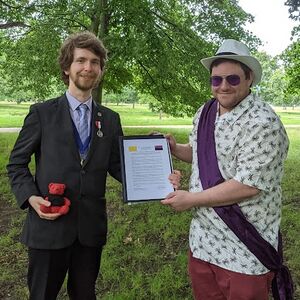
The Empire of Austenasia establishes and maintains diplomatic relations with other nations through the Foreign Office, led by the Chief Ambassador. The Chief Ambassador has the power to grant informal "states of friendship" and tacit recognition, but official recognition of another nation can only be granted by an Act of Parliament or Imperial Decree.
Austenasia has since late 2009 sought diplomatic relations mainly through the MicroWiki Community, but also holds close friendly relations with other nations such as Molossia, Westarctica and Ladonia. Austenasia is the foremost power of the Carshalton Nations, with the Austenasian Monarch overlord of said "sector".
Austenasia holds friendly relations with several small nations, particularly Wildflower Meadows, Orly, the Holy Roman Empire, Adammia, and Imvrassia.
The nations with which Austenasia is closest include the Kingdom of Wyvern, the only country with which Austenasia holds an official alliance. Furthermore, some countries are granted a special position as a protected state of the Empire; unlike an alliance, which entails mutual defence, Austenasia is bound to defend a protected state upon request whereas no obligations are required in return. There are currently three protected states of Austenasia: the two kingdoms in Orly (since June 2013), and the Principality of Wildflower Meadows (since May 2016).
Various state visits and diplomatic meetings involving Austenasia have taken place, the first being a state visit to the Kingdom of Moylurg in August 2010. The Empire has since been represented at multilateral summits as well, most notably the 2011 Intermicronational Summit, the 2012 Polination Conference, and the 2019 GUM Birmingham Summit.
Administrative divisions
Austenasia is comprised of fifty seven separate pieces of land.
The smallest piece of Austenasian land, Glencrannog, is a mere one square foot of land, more than 370 miles away from Wrythe. The largest area in Austenasia is Chersoneses, an enclave of Ukraine. Most administrative divisions consist of a single contiguous claim, but several have various exclaves; Wrythe, Nahona, and North Nahona are examples of Towns composed of two non-contiguous pieces of land, and Navurania is composed of four.
Austenasia is divided into Cities (Wrythe), Towns Chalcedon, Nahona, North Nahona, Procyon, Blue Ridge, Oppidum Tubae, Helinium, and Chandler), March(Campo de Jonatán), Territories (Glencrannog, Corinium Terentium, Glencoe, Iostan na Beithe, Aurora, Green Gate, Peach Ponds, Nikaia, Florencium Carolina, Jackson, Western Jarrahview, Travarn, Cenomannica, Nervenston, Prahova, Elmythia, Glainamar, and Garelsh) and Crown Dependencies (New South Scotland, Enfriqua, Dekker, Imperia, Esmondia, Rushymia, Kingeston, Trebizond, Chersoneses, Kaiomenia, New Pontunia, Navurania, Shuhan, New Flat Rock, and Ganapati Vihar). Towns and Cities are inhabited areas fully incorporated into the Empire, and each elect a Representative to the House of Representatives. Marches are inhabited areas associated with a Town or City for electoral purposes but administered independently. Territories are also fully incorporated into the Empire, but are not inhabited and so are not represented in Parliament, with Austenasian law being enforced by a Governor if possible. Crown Dependencies are autonomous areas, with Austenasian law not automatically applying to them unless specified in the legislation; however, they fall under Austenasian sovereignty and are administered directly by the Throne (with representatives of the Emperor known as Governing Commissioners usually being appointed).
| Flag | Arms | Picture | Name | Annexed | Population | Official(s) | ||||||
|---|---|---|---|---|---|---|---|---|---|---|---|---|
| Capital City | ||||||||||||
| N/A | 
|

|
Wrythe | 20 September 2008 (as a Town) 8 January 2017 (as a City) |
4 | Representative None | Pater Patriae Lord Terry, Duke of Davidopia | |||||
| Towns | ||||||||||||
| N/A | N/A | 
|
Chalcedon | 31 October 2019 | 6 | Representative Lord İsmetcan Saraç, Count of Bithynia | ||||||

|

|

|
Nahona | 19 January 2020 | 3 | Representative Lord William Wilson, Duke of Taysha | ||||||

|

|
North Nahona | 20 June 2020 | 4 | Representative Dame Brianna Stokely, DOB | |||||||

|

|

|
Procyon | 5 October 2020 | 2 | Representative Lord Michael Simpson, Count of Occibrazos | ||||||

|

|

|
Blue Ridge | 20 July 2020 (as a Territory) 20 December 2020 (as a Town) |
5 | Representative Lady Addison O'Halloran, Baroness of Blue Ridge | ||||||

|

|
File:Oppidumtubae.png | Oppidum Tubae | 25 June 2021 | 2 | Representative Lord Sander Koff, Duke of Aesti | ||||||
| N/A | 
|

|
Helinium | 14 May 2022 | 2 | Representative Bradley, King of the Romans | ||||||

|
N/A | 
|
Chandler | 23 December 2022 | 3 | Representative Lord Michael Colquhoun, Baron of Chandler | ||||||

|

|

|
Caldari | 3 December 2014 (as a March) August 2024 (as a Town) |
2 | Representative Lord John Gordon, Viscount of Thetford | ||||||
| Marches | ||||||||||||

|

|

|
Campo de Jonatán | 1 August 2020 | 2 | Associated town Nahona |
Margrave Lord William Wilson, Duke of Taysha | |||||
| Territories | ||||||||||||
| N/A | N/A | 
|
Glencrannog | 21 February 2009 | 0 | Governor Vacant | ||||||

|
N/A | 
|
Corinium Terentium | 4 May 2013 | 0 | Governor Lord Andrew, Baron of Corinium Terentium | ||||||
| N/A | N/A | Iostan na Beithe | 13 April 2014 | 0 | Governor Lord Sebastian Linden, Baron of Glencoe | |||||||
| N/A | N/A | 
|
Glencoe | 13 April 2014 | 0 | Governor Lord Sebastian Linden, Baron of Glencoe | ||||||
| N/A | N/A | 
|
Aurora | 30 January 2016 | 0 | Governor Lord Karl Friedrich, Duke of Bohemia | ||||||

|
N/A | 
|
Green Gate | 14 March 2019 | 0 | Governor Lord Zarel Smith, Baron of Green Gate | ||||||

|
N/A | 
|
Peach Ponds | 4 April 2020 | 0 | Governor Lord Casper von Naveria, Count of Cowyetton | ||||||
| N/A | 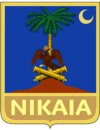
|

|
Nikaia | 25 May 2020 | 0 | Governor HSH Prince Edward I | ||||||

|
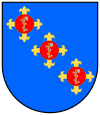
|

|
Florencium Carolina | 20 July 2020 | 0 | Governor Lord Michael Simpson, Count of Occibrazos | ||||||

|

|

|
Jackson | 1 August 2020 | 0 | Governor Lord William Wilson, Duke of Taysha | ||||||

|
N/A | 
|
Western Jarrahview | 5/6 January 2021 | 0 | Governor Lord Daniel Hamilton, Count of Jarrahview | ||||||
| N/A | N/A | 
|
Travarn | 10 July 2021 | 0 | Governor Lord Hunter Prater, Duke of Dixie | ||||||

|

|

|
Cenomannica | 11 August 2021 | 0 | Governor Vacant | ||||||

|
N/A | 
|
Nervenston | 30 July 2022 | 0 | Governor Lord Dominik Kądziołka, Baron of Nervenston | ||||||

|
N/A | 
|
Prahova | 1 December 2023 | 0 | Governor H.E. Marshal Ștefan Marius Snagoveanu | ||||||

|

|

|
Elmythia | 12 December 2023 | 0 | Governor Lord Konstantinos Papanatsios, Baron of Elmythia | ||||||

|
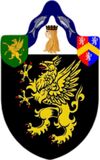
|

|
Glainamar | 12 March 2024 | 0 | Governor Lord Mick Griffin, Baron of Glainamar | ||||||
| N/A | 
|

|
Garelsh | 13 April 2024 | 0 | Governor Lord Oscar Owens, Baron of Garelsh | ||||||
| Crown Dependencies | ||||||||||||

|

|

|
New South Scotland | 25 January 2013 | 0 | Governing Commissioner H.E. The Rt Hon. Sir Hugh McFarlane, KCA | ||||||

|

|

|
Enfriqua | 15 January 2015 | 4 | Governing Commissioner H.E. Akka Bey | ||||||

|
N/A | 
|
Dekker | 16 July 2015 | 6 | Governing Commissioner The Rt Hon. Patrick-Dylan Knox | ||||||
| N/A | N/A | 
|
Imperia | 29 October 2015 | 4 | Governing Commissioner The Rt Hon. Ketan Uzagi, OAO | ||||||

|

|

|
Esmondia | 29 October 2015 | 0 | Governing Commissioner HRH King Tarik | ||||||

|
N/A | 
|
Rushymia | 29 August 2018 | 0 | King HIM Emperor Aggelos I | ||||||

|
N/A | 
|
Kingeston | 5 December 2018 (held Town status from 11 May 2020 - 24 August 2021) |
0 | Governing Commissioner Vacant | ||||||

|

|

|
Trebizond | 8 January 2020 | 3 | Governing Commissioner Alexander IV | ||||||

|
N/A | 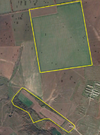
|
Chersoneses | 1 June 2020 | 1 | Governing Commissioner Mykolai Oliynyk | ||||||

|
N/A | 
|
Kaiomenia | 5 October 2020 | 0 | Governing Commissioner Hegemon Thomas Marios I | ||||||

|

|

|
New Pontunia | 27 October 2020 | 5 | Governing Commissioner Andrew I, Duke of Pontunia | ||||||

|
N/A | 
|
Navurania | 15 February 2022 | 0 | Governing Commissioner Winston Churchill Jr. | ||||||
| N/A | N/A | 
|
Shuhan | 16 February 2022 | 2 | Governing Commissioner H.E. Juntao Yang, Duke of Shuhan | ||||||
| N/A | N/A | 
|
New Flat Rock | 20 December 2020 (as Town) 1 December 2022 (as Crown Dependency) |
5 | Governing Commissioner Lord Hunter Prater, Duke of Dixie | ||||||
| N/A | N/A | 
|
Ganapati Vihar | 1 December 2022 | 0 | Governing Commissioner Soumyadip Sengupta | ||||||
Government
Austenasia is an imperial monarchy, currently ruled by the House of Vatazides. The current monarch is His Imperial Majesty, Emperor Aggelos I, who has held the throne since the abdication of Jonathan I on 29 September 2024. The holder of the Throne is also advised by the Privy Council, a body which he can consult for and which can issue the Monarch or Regent with non-binding advice and suggestions.
Although the Throne is officially hereditary, the Senate may amend the line of succession with the Monarch's consent. Several weeks before the institution of the regency, the relatives of Jonathan I were removed from the line of succession by his own request and replaced with five statesmen considered more suitable candidates to be in line to one day succeed as Emperor. Indeed, out of the four Monarchs that Austenasia has had in its history, the second and third were not related to Terry I, the founding Emperor, and instead ascended the Throne by Acts of Parliament.
On a daily basis, most executive power is exercised by the Throne and the Cabinet of Austenasia, with the Prime Minister helping to co-ordinate the activities of Cabinet in accordance with policies decided by himself and the Monarch. Legislative power is vested in Parliament, which is comprised of the Regent, Prime Minister, and House of Representatives. The judiciary is comprised of Town Courts, High Courts, and an Imperial Court, to try differing degrees of crimes, with the Consuls issuing sentences for those found guilty.
The part of Austenasia under the control of the central government is split into administrative districts of one City and nine Towns, each run by a Council of 3-20 people, and twenty one Territories, uninhabited areas of land in which law is when possible enforced by a Governor. In practice, Town and City Councils generally tend to desist from formally making any but basic and emergency bye-laws, with local government tending to function more on a communal consensus basis. All Representatives make up the House of Representatives, out of which is elected by universal suffrage the Prime Minister no less often than every four years. The Prime Minister and House of Representatives propose, debate and reword laws to be passed. They are then given Imperial Consent by the Regent, entering them into law.
The Empire of Austenasia also contains fifteen Crown Dependencies, which fall under the direct and absolute authority of the Regent, with Governing Commissioners usually being appointed to represent him and exercise his power. Acts of Parliament and other Austenasian laws do not apply to Crown Dependencies unless explicitly stated, with the Governing Commissioners exercising near-absolute domestic power.
Just over half of all Austenasians - 51% - do not live within Austenasia itself, instead holding the status of non-residential subjects. They are grouped into four Divisions, each of which also elects a Representative to Parliament.
Ministries
The following Government Ministries are headed by ministers who comprise Cabinet:
- Home Office - led by the Home Secretary, responsible for maintaining communication between the central government and local authorities, keeping a census of all residents and subjects of Austenasia, supervising the running of the State Intelligence Agency, and protecting the environment of the Empire.
- Treasury - led by the Chancellor, responsible for managing the income of the Empire through fundraising and legal fines, and for the financial policy of the Empire.
- Foreign Office - led by the Chief Ambassador, responsible for maintaining diplomatic relations with other nations.
- Ministry of Defence - led by the Minister of Defence, responsible for the implementation of government defence policy and, together with the Treasury, the funding of the Austenasian Armed Forces.
- Ministry for Culture - led by the Minister for Culture, responsible for promoting and preserving Austenasian culture.
- Ministry of Justice - led by the Attorney General, responsible for providing legal advice and services to the Government and supervising the running of the Austenasian Police.
Members of the Government
-
H.E. The Rt Hon.
Sir Hugh McFarlane, KCA:
Attorney General
Governing Commissioner of New South Scotland -
Dame Brianna Stokely, DOB:
Representative of North Nahona -
Lord İsmetcan Saraç, Count of Bithynia:
Representative of Chalcedon -
Lord Michael Colquhoun, Baron of Chandler:
Representative of Chandler -
H.E. Professor Sir Sanjib Bhattacharya, KOB, KCA:
Representative of the Asia Division -
The Hon. Dr Kalin Yanev:
Representative of the Europe and Africa Division -
Lord Casper von Naveria, Count of Cowyetton:
Governor of Peach Ponds -
HSH Prince Edward I:
Governor of Nikaia -
Lord Hunter Prater, Duke of Dixie:
Governor of Travarn
Governing Commissioner of New Flat Rock -
Lord Dominik Kądziołka, Baron of Nervenston:
Governor of Nervenston -
Lord Konstantinos Papanatsios, Baron of Elmythia:
Governor of Elmythia -
Lord Oscar Owens, Baron of Garelsh:
Governor of Garelsh -
H.E. Akka Bey:
Governing Commissioner of Enfriqua -
The Rt Hon. Patrick-Dylan Knox:
Governing Commissioner of Dekker -
The Rt Hon. Ketan Uzagi, OAO:
Governing Commissioner of Imperia -
Mykolai Oliynyk:
Governing Commissioner of Chersoneses -
Winston Churchill Jr.:
Governing Commissioner of Navurania -
Soumyadip Sengupta:
Governing Commissioner of Ganapati Vihar
Law and order
Law enforcement in the Empire of Austenasia is the responsibility of the Austenasian Police. Jurisprudence operates on a civil law legal system, with crimes being tried by a Town Court, a High Court, or the Imperial Court, depending on the severity of the offence. There are no permanent courts due to the rarity of crimes, with instead a court of the necessary rank to be summoned upon a person being charged with a crime. If a person is found guilty of a crime, then their punishment is decided by the Austenasian consuls. Civil disputes are resolved by a magistrate appointed by the Monarch, Prime Minister or Attorney General.
Austenasia has an extremely low crime rate. Since September 2008, only two arrests have ever been made, both on the same person, namely Princess Caroline (the first time for her part in the Skirmish of the Treasury and the second time for announcing an intention to overthrow the Emperor). The Austenasian Police once unsuccessfully attempted to arrest Lord Marshal William for rebellion and treason after he declared war on the Esmondian government, but he was granted amnesty and pardon at the end of the war.
Only three trials have ever taken place in Austenasia: Parliament vs. HIH Princess Caroline on 31 May 2009, The Imperial Majesty vs. HIM Emperor Jonathan I from 13–19 January 2016, and The Imperial Majesty vs. Lady Sophia Albina from 26–27 June 2021.
Capital punishment in Austenasia was outlawed on 13 December 2008, and this abolition was reaffirmed both on 21 March 2009 and 20 September 2011. The only sentences ever given in Austenasia so far have been exile and unpaid community service.
Law enforcement in the Empire is assisted by the State Intelligence Agency (SIA), a covert and secretive organization which gathers information about domestic and foreign threats. The SIA was founded in 2009, but its existence was not officially acknowledged until 2017.
Military
The Austenasian Armed Forces are the military of the Empire of Austenasia, administrated and partially funded by the Ministry of Defence. The Monarch is commander-in-chief of the military, and Dame Brianna Stokely serves as Minister of Defence.
Between May 2009 and June 2020, Austenasia had a standing army which at one point counted 50 members. However, a prolonged peace since the War of the Orlian Reunification at the end of 2010 and many nominally enlisted soldiers falling out of contact with the government over the subsequent decade led to the Armed Forces Act 2020 being passed on 17 June of that year, by which the regular standing army was abolished. The Austenasian Armed Forces now consist of the Limitanei (local reserve militias), the Comitatenses (field armies which may be raised by the national government in times of war) and the Imperial Guard (the standing bodyguard unit of the Monarch).
Demographics
Population
Austenasia has a total population of one hundred and forty two people. Sixty five of these are residents registered as living in Austenasia, and seventy seven are non-residential subjects who are entitled to vote in elections and to hold the status of an Austenasian national despite not officially living within the Empire, due to having been granted the status by Parliament for various reasons or having subsequently moved away from Austenasian land claims. Those residents which are over the age of sixteen years hold the status of subject, meaning that they can vote in general elections and have more rights in regards to partaking in local government. Subjectship is sometimes also granted by Parliament to a limited number of younger residents should they hold governmental positions.

On 12 November 2008, Act 20 (Honorary Subjects) was passed, creating the status of Honorary Subjects, to be bestowed by the Secretary-General on applicant non-Austenasians. The number of Honorary Subjects reached 100 on 5 May 2012 and 500 on 21 August 2020. There are currently 640 Honorary Subjects of Austenasia, residing in every continent on Earth other than Antarctica.
Languages
English is the most commonly spoken language in Austenasia, known and used daily by the majority of the population. English is generally the only language used for government business, although some Latin is rarely used for more ceremonial occasions. There are exceptions to the dominance of English in Austenasia. In Enfriqua, French is the vernacular; Marathi in Imperia; Turkish in Chalcedon and Trebizond; Ukrainian in Chersoneses; Estonian in Oppidum Tubae; Mandarin Chinese in Shuhan; and Dutch in Helinium.
Culture
Imperium
Since the reign of Esmond III, a world-view often known as the Imperium theory has grown in popularity within Austenasia, being partially adopted by official legislation during the reigns of Declan I and Jonathan I. This worldview, which is both officially and popularly adhered to by the other Carshalton Nations and also particularly prevalent amongst the Austenasian Armed Forces, attaches significant importance to the title "Emperor", viewing the Austenasian Throne as being in succession to that of the Roman Emperors. This has helped accelerate the increase of monarchical authority in Austenasia and also resulted in several Roman elements being adopted by the Empire, such as a Latin national motto loosely based on SPQR, the institution of a Senate and of annually-appointed consuls, and - most openly - the inclusion of "Emperor and Autocrat of the Romans" in the official style of the Monarch.
Religion
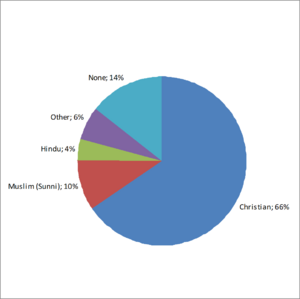
Since 21 June 2017, Austenasia has been an officially Christian country. Only baptised Christians are eligible to inherit and hold the Throne, Christian feast days are celebrated as public holidays, and Christian symbols are used for example in the national coat of arms. However, freedom of Austenasians to choose and practice their own religion has been guaranteed by law since December 2008, and is entrenched under Article XII, Paragraph C of the Constitution.
From the founding of Austenasia in September 2008 until the introduction of the first non-residential subject in April 2010, the entirety of Austenasia's population identified as Methodist Christians. As more people joined Austenasia, the proportion of Methodists within Austenasia declined, and Methodism is now professed by less than 5% of the population.
Out of all Austenasian subjects and residents to respond, over five-sixths profess belief in a religion and less than a sixth identify as atheist or agnostic.
As of May 2024, roughly two thirds of Austenasians (65.5%) to respond identified as Christians. The main other two religions are Sunni Islam and Hinduism, which respectively have 12 and 5 known practitioners.
Media
Residents of Austenasia's enclaves read newspapers imported from and watch television channels broadcast from their neighbouring countries. The Austenasian Times is the semi-official Austenasian news service, founded by Jonathan I in November 2012 while he was still Crown Prince.
Austenasia has its own broadcasting corporation, Austenasian Television Productions (ATP). ATP, founded in December 2008, as well as publishing the Prime Minister's Broadcasts, also produces films for two series - Austenasian Events, small documentaries which record events concerning the Empire, and Cool Barbie, a sci-fi fantasy drama about a Barbie's encounters with extraterrestrials and villains in a world where toys are alive. All of these films are published on the ATP YouTube account, where they can be viewed free of charge. The former Lord Charles C. also produced Austenasian videos which he published on his website, Grinning Kettles. These videos were stop motion animated and contained surrealism and nonsense. Bogeyshire is a web series that includes four of these videos and Die Fairgrassen! is one other of said videos.
Notes
- ↑ Not including 640 foreign Honorary Subjects
References
- ↑ "Frequently Asked Questions", Empire of Austenasia, Retrieved 15 October 2011
- ↑ [[w:List_of_micronations "List of micronations", Wikipedia, the free online encyclopedia], Retrieved 15 October 2011
- ↑ "List of Micronations by Date Founded", MicroWikia, Retrieved 4 November 2011
- ↑ "History of Austenasia", Empire of Austenasia, Retrieved 15 October 2011
- ↑ "Towns", Empire of Austenasia, Retrieved 4 November 2011
- ↑ "Esmond III, Emperor of Austenasia - Becoming Emperor", MicroWikia, Retrieved 4 November 2011
- ↑ "2010 - Spring 2010", Austenasia News Archives, Retrieved 4 November 2011
- ↑ MicroWikia Newsfeed Revision as of 15:23, March 7, 2010 by Friedebarth, Retrieved 4 November 2011
- ↑ MicroWikia Newsfeed Revision as of 15:27, May 24, 2010 by Austenasia, Retrieved 4 November 2011
- ↑ "December Confession", MicroCommons, Retrieved 19 December 2011
- ↑ "2010 - Winter 2010", Austenasia News Archives, Retrieved 4 November 2011
- ↑ MicroWiki Newsfeed as edited by Austenasia at 19:41, 31 March 2011, Retrieved 4 November 2011
- ↑ Act 150 (Assimilation into Austenasia of the Midget Nation-in-Exile) of the Parliament of Austenasia, Retrieved 6 November 2011
- ↑ MicroWiki Newsfeed as edited by Austenasia at 06:10, 10 April 2011, Retrieved 6 November 2011
- ↑ Sutton Guardian, 23 September 2011,"Carshalton "micronation" pushes for independence from Sutton"
- ↑ MicroWiki Newsfeed as edited by Austenasia at 18:50 on 20 September 2011, Retrieved 27 March 2012.
- ↑ First Imperial Decree of HIM Emperor Declan I, Retrieved 27 March 2012.
- ↑ Augustus, Jonathan (20 January 2013) Declan I abdicates - Jonathan I ascends to the Throne, Austenasian Times. Retrieved 22 January 2013.
- ↑ Augustus, Jonathan (25 January 2013) Austenasia gains a Crown Dependency, Austenasian Times. Retrieved 14 May 2013.
- ↑ Augustus, Jonathan (20 February 2013) South American territory joins the Empire, Austenasian Times. Retrieved 14 May 2013.
- ↑ Augustus, Jonathan (4 May 2013) New territory annexed as administrative changes take place, Austenasian Times. Retrieved 14 May 2013.
- ↑ Augustus, Jonathan (4 May 2013) The Empire continues to expand, Austenasian Times. Retrieved 14 May 2013.
- ↑ Augustus, Jonathan (12 July 2013) Palasia annexed as ties cut with New Wessex, Austenasian Times. Retrieved 12 July 2013.










